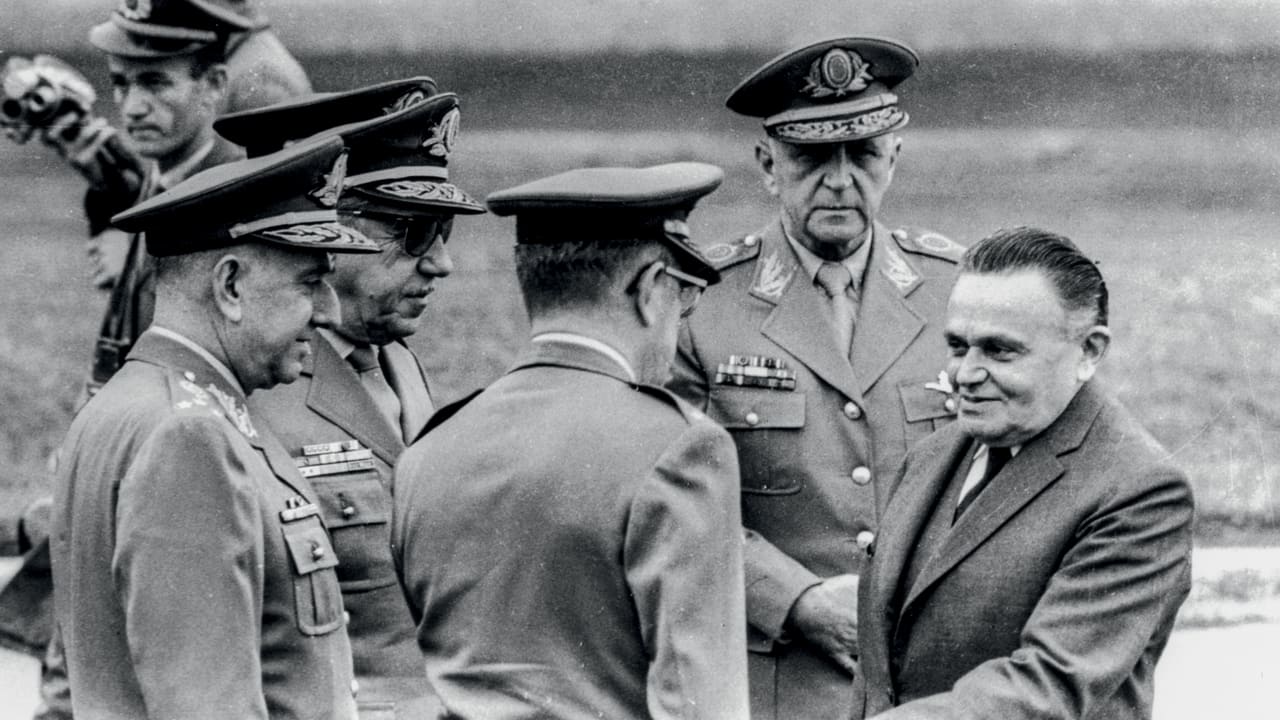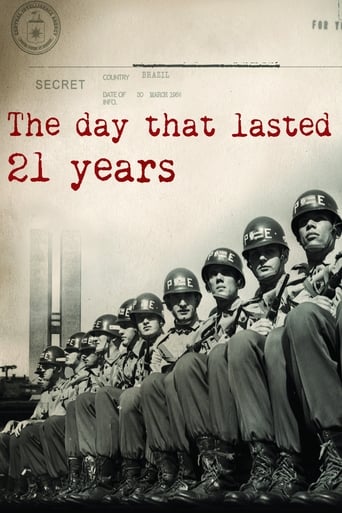



Slow pace in the most part of the movie.
The performances transcend the film's tropes, grounding it in characters that feel more complete than this subgenre often produces.
View MoreThere are moments that feel comical, some horrific, and some downright inspiring but the tonal shifts hardly matter as the end results come to a film that's perfect for this time.
View MoreThe storyline feels a little thin and moth-eaten in parts but this sequel is plenty of fun.
View MoreWas the CIA responsible for the military coup d'état in Brazil in 1964? So-called "Operation Thomas Mann" is a reference to the then Assistant Secretary of State for Inter-American Affairs of the Lyndon Johnson Administration. It happens, however, that nonexistent documents were later forged by a Czech spy who, in 1964, operated in Brazil via KGB: Mr. Ladislav Bittman, who acted on behalf of Czechoslovakia's Service of Disinformation, and later told the story in his book "The KGB And Soviet Disinformation." Bittman wrote: "We wanted to create the impression that the U.S. were forcing the OAS to take an anticommunist position as the CIA planned coups d'état against the regimes of Chile, Uruguay, Brazil, Mexico and Cuba (...) The operation was designed to create vis-à-vis the Latin American audience a preventive policy against hard-line America, to incite demonstrations of intense anti- American sentiments and to label the CIA as a notorious perpetrator of undemocratic intrigue". Bittman's revelations were made public in 1985, but the Brazilian media never mentioned them, either through ignorance or for not wanting the public to be aware of long-standing lies. Anyway, the basic scenario was told in the 1970s by the American historian Phyllis Parker in her book "The Role of the United States in the 3/31 Coup." Parker interviewed the main players in the episode, having had access to most of the secret correspondence. She came to the conclusion that the 1964 coup was staged by Brazilians, not by Americans. This sounds obvious, but the alternative (leftist) version sustains that the takeover by the military was planned in Washington and included an invasion of Brazil by U.S. Marines. Phyllis Parker actually showed that the U.S. monitored the situation closely, lobbied with her usual aggressiveness, and did have a Plan B in case Brazil suffered a civil war. In the words of that historian, there is no evidence that the United States instigated, planned, directed or participated in the execution of the 1964 coup. In a nutshell, the so- called "Operation Brother Sam" denounced by this film did start, but was aborted as redundant. Democracy prevailed (unfortunately only for a certain time). All interviewees in this film take on a predictably politically correct, anti-American core stance. The film would be less unbalanced or sectarian if it didactically described the big picture, i.e. the broader context of the Cold War, the Foggy Bottom-inspired Domino Theory, the recent establishment of communism in Cuba, the assassination of JFK etc.
View MoreHere's an enlightened and good documentary that discloses the events surrounding one of the most fateful days in Brazilian history, a date that haunted us for more than 20 years with the period of military dictatorship (1964-1985), the longest regime of a South American nation. But "The Day that Lasted 21 Years" isn't just about the dark March 31, 1964; it presents to us the inception of a political and military coup supported by the United States and its fear of seeing an important economical/strategical partner turn into another communist Cuba. In fact, this isn't news to me. I know those facts ever since I was kid but I also know that the masses of our people or even most politicized individuals don't know anything about it; and in our current days of a majority claiming to support right wing parties and ideologies, it feels like this document it's important and mandatory to be seen. Yes, it's clearly established here that Lincoln Gordon, U.S. ambassador in Brazil, was the main figure behind the coup by feeding Kennedy and Lyndon Johnson about the politics behind president João Goulart's basic reforms that gave more power and rights to the common people and demanded more from the nation's rich and big foreign business folks who were unfair with their deals, usually avoiding to pay what's owed to the country. However, the film overlooks that Gordon was a part but not the first to raise questions and fears about the government; the bourgeoisie of the period were the first to feel threatened by all those new social rules that never favored them and since they had the capital, resources and means for it (along with unsatisfied military), the next step was obvious. Gordon makes his plans, Kennedy met Goulart and didn't like the daring man who refused to comply with some of the American president ordeals but then came November 22, 1963 and the rest is history...but Lyndon and his staff kept looking at Brazil and made the coup d'etat happen in 1964. And to what cost the American policy and the rich people from Brazil turned the nation into it? The regime deposed a president (who ran away to Uruguay); abruptly cut short politicians careers, closing many opposition parties and even closing the Congress; only marshals and generals were elected leaders and each one went by created new institutional acts that prevented freedom of speech, the right to strike, persecuted communists and alleged ones with prison, torture, murders and disappearance; censorship of all communication forms; and more. On its positive light, the economic factor was good with its masked inflation (by the time it ended we realized how awful our monetary system were), never a sense of crisis like the 1980's and early 1990's proved to be; the educational system went through a great renewal (but students and teachers didn't have the liberty to say what they wanted to say, it was very strict) and that's it. I'm giving this background because the film failed in providing this. The main focus was to tell about the events surrounding the day one of the coup and then they moved forward in telling about its first years. Nice but since the makers already had the 21 years in the title, I find that at least they should present all the important events of those 20 years to make a more impacting historical piece, one that could highlight all of what happened during those rough and darker years that still resonates in our political stream system. All the archive footage was exemplary and great to watch; the interview with personalities from both sides of the issue was excellent and it even includes American historians who had access to memos and documents exchanges between the ambassador and the White House; and the documentary knows how to maintain a good dialogue between those opposite forces (but obviously that testimonies from the regime's supporters sound preposterous "we were right then and still are with no regrets" as evidenced by the ludicrous former general Newton Cruz and its crazed facial expressions). The greatest insight presented and one that I never asked myself was concerning about why Goulart didn't react to such unexpected attack - after all, he was still in command and could use the rest of military that was left. But his decision (at least that one since his politics though commendable were quite naive, and I don't think he was a communist, he was just too liberal for his time) turned out to be the best, because on that day with tanks and soldiers going from several states a bloodshed could have happened - lets not forget about American aircraft carriers on the Brazilian shore just waiting and hoping for some resistance. As history classified later on, a very easy coup - some cowardice as well, no shame as it happened before in 1891 with our very first president when republic was recently created - but with less menace and power of fire. It's not a complete documentary but it portrays with great accuracy and effect the reality of the early days of one of the nation's worst tragedies. Camilo Tavares documentary is a memorable and highly powerful work. 9/10
View More